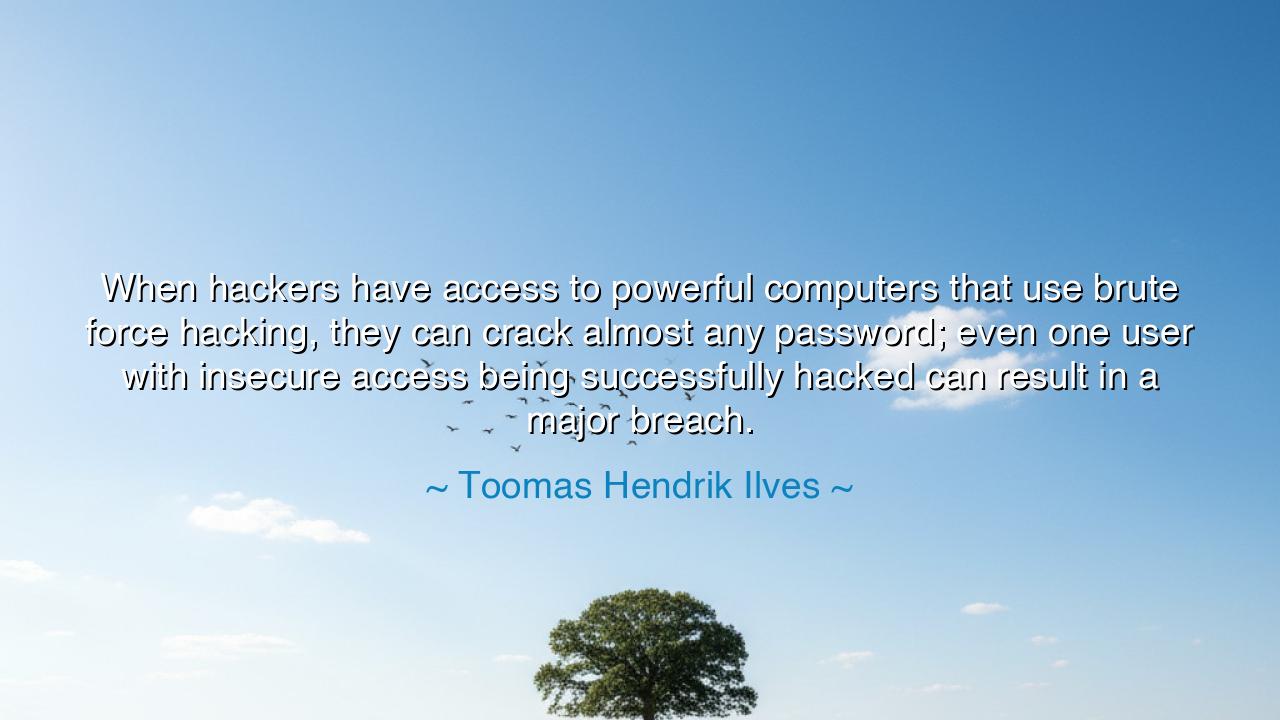
When hackers have access to powerful computers that use brute
When hackers have access to powerful computers that use brute force hacking, they can crack almost any password; even one user with insecure access being successfully hacked can result in a major breach.






"When hackers have access to powerful computers that use brute force hacking, they can crack almost any password; even one user with insecure access being successfully hacked can result in a major breach." – Toomas Hendrik Ilves
In the shadows of our modern world, where the flow of information is the lifeblood of civilization, there exists an unseen war—one fought not with swords, but with computers. Toomas Hendrik Ilves, in his warning, speaks to the dangers that arise when technology, meant to serve humanity, is turned against it. The image he paints is stark: a world where the strength of a single weak link in the digital chain can lead to a breach of unimaginable consequence. Just as a single crack in the dam can flood an entire city, so too can a single insecure password lead to the collapse of a vast system. This is the reality of our age, where the powerful forces of brute force hacking threaten the very foundations of our digital world.
The ancient wisdom teaches us that even the mightiest empires were undone by the simplest of mistakes. In the time of Rome, the city’s defenses were formidable—its walls and armies strong, its leaders wise. Yet, the Roman Empire fell not because of a single great battle, but because of a series of smaller, seemingly insignificant flaws—the overextension of its borders, the corruption within its ranks, and the vulnerabilities in its infrastructure. The Breaches were gradual, but once they began, they spread rapidly. In much the same way, a small weakness in the digital world—a single password easily cracked—can lead to the collapse of an entire network, exposing the most sensitive of data to malicious forces.
In the Middle Ages, the great fortresses of Europe were built to protect kingdoms from invasion, but even these imposing walls had their weaknesses. The gates, often the most vulnerable parts of the structure, were where attackers would focus their efforts. A single compromised gate—a momentary lapse in vigilance—could allow invaders to flood the castle and bring down the kingdom. Similarly, in our digital age, it is often the smallest of flaws—an insecure access point, a weak password—that becomes the breach through which hackers can gain access to an entire system. The digital world, like the great fortresses of old, must be vigilantly defended, for a single weak link can unravel everything.
This principle is exemplified by the story of the Trojan Horse in Greek mythology. The Greeks, in their desperate attempt to breach the city of Troy, used what seemed to be a gift—a large wooden horse—to infiltrate the city’s defenses. While the walls of Troy were impenetrable, it was the deceptive weakness of the horse that led to the downfall of the city. The city’s leaders, in their complacency, allowed a simple gift to breach their defenses, not realizing that it harbored the very force that would bring about their destruction. Similarly, a single small weakness—an unprotected password or a forgotten security measure—can provide the entry point for hackers to exploit, leading to a major breach.
The lesson that Ilves shares is timeless: security—whether in the digital world or the physical world—requires constant vigilance. It is not enough to rely on the strength of the system; it is the weakest link that must be fortified. The one vulnerable point—whether it is a password, a piece of software, or a lapse in judgment—becomes the doorway through which malicious actors can infiltrate and wreak havoc. The wise must always remember that security is not just about the strongest defenses, but about protecting every access point, no matter how small or seemingly insignificant.
In our own lives, this calls for awareness and discipline. Just as a kingdom’s defense rests not only on its walls but on the integrity of every soldier, so too does our digital security rest on every password we create, every system we use, and every access point we open. We must not be lulled into a false sense of security, thinking that one weak password or a lax practice won’t matter. In this interconnected age, a single flaw can lead to profound consequences. As we continue to embrace the wonders of the digital age, we must remember that our greatest strength lies not just in the complexity of our systems, but in the vigilance we apply to each link in the chain.
Therefore, the wisdom here is simple but profound: do not underestimate the small things. Whether in life, in relationships, or in technology, we must never ignore the little flaws that, when left unchecked, can lead to great destruction. Every detail matters, and every part of the system must be guarded and protected. By doing so, we ensure not only our safety but the strength and resilience of the systems we build, and the trust we place in them. Let the vigilance we practice in our digital lives be a reflection of the wisdom passed down through the ages: small weaknesses can have great consequences, but through careful attention, we can safeguard all that we hold dear.






AAdministratorAdministrator
Welcome, honored guests. Please leave a comment, we will respond soon